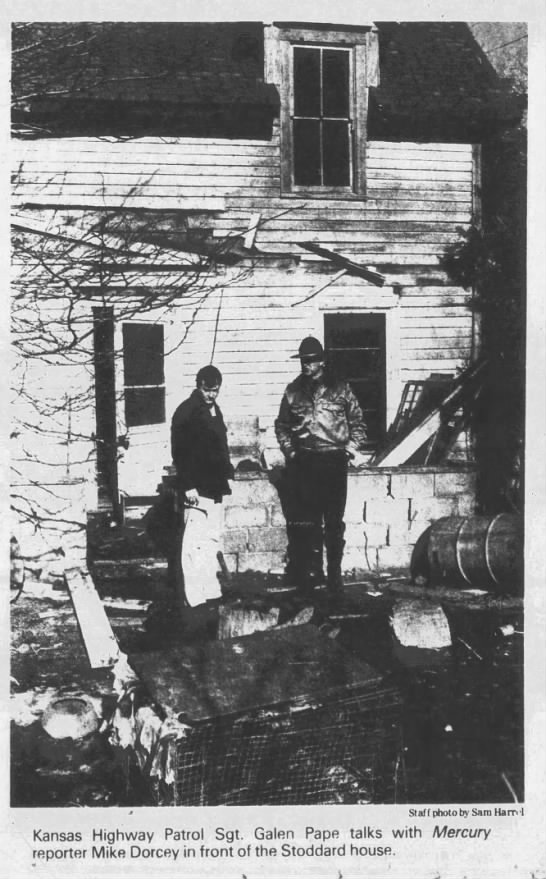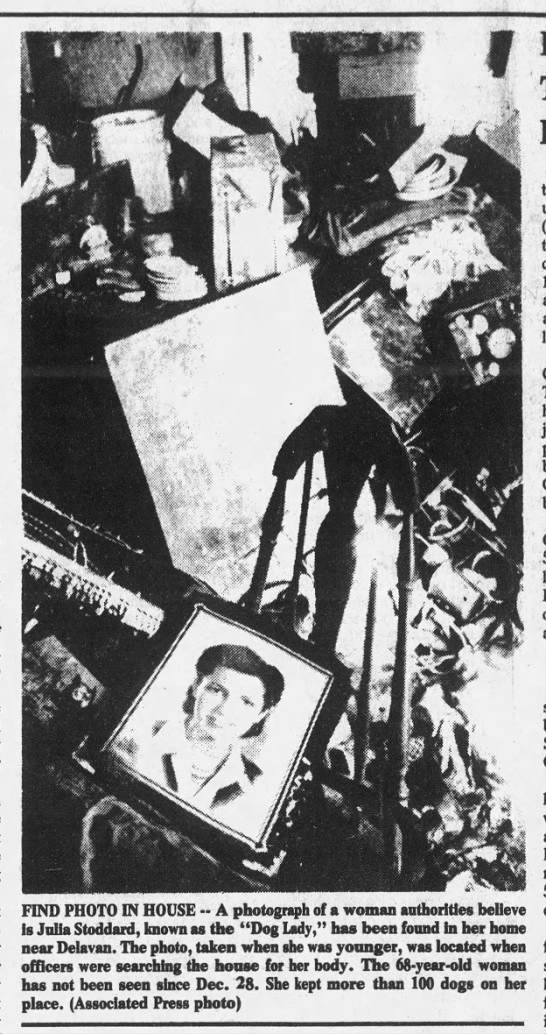Stoddard was a civilian employee in Fort Riley. After her retirement in 1973, she purchased two acres just outside of Delavan, living in a ramshackle little house on the property. She was divorced, childless, and, as far as anyone knew, had little communication with her relatives.
She kept very much to herself. She was an intelligent woman who read voraciously--her favorites were Western novels. That was about all anyone in town could say about her.
Oh, and that she loved dogs. Perhaps a bit too well. Along the nearby highway, unwanted dogs were often abandoned to fend for themselves. Stoddard would collect the strays and bring them back to her property. Before very long, she had accumulated up to 500 of them. Unlike most people who hoard large numbers of pets, the dogs were well cared-for--arguably, Stoddard saw to it that they had a higher standard of living than she herself enjoyed. She spent so much money on dog food that she often had little left over to feed herself. She gave the dogs names, and when they occasionally ran off, she would go to the sheriff anxiously asking him to look out for them. Inevitably, she became known around town as “The Dog Lady.”
While the dogs were kept clean and tidy, her little home became filled with refuse, dust, dirt, mud, and dog manure. Stacks of books were piled everywhere. She had no heat, electricity, running water, telephone service, stove, or refrigerator.
Stoddard was indifferent to the squalor, and as she was a quiet, law-abiding sort who caused no trouble, Delavan was content to leave her be. Although she refused to let anyone on her property--she was known to have run off social workers and the county health official with a shotgun--Delavan residents who interacted with her found Stoddard to be a nice, friendly person who was entirely in her right mind. When asked about her eccentric ways, a neighbor named Edward Jones shrugged, “It’s like Howard Hughes. He had his right to his lifestyle. She has a right to her friendship with those dogs.”
Life went on uneventfully. In late December 1984, it was snowing heavily in Delavan. On December 28, a neighbor passing by Stoddard’s property saw the 69-year-old attempting to shovel out her old pickup truck.
It was the last time anyone ever saw Julia Stoddard, alive or dead.
On December 31, her neighbor Jesse Bettles realized that he had not seen or heard anything from her for several days, which concerned him enough to alert the sheriff, Richard Malek. When Malek went to Stoddard’s home, he found an appalling sight: Stoddard’s beloved dogs--she had about 100 at the time--were freezing and slowly starving to death. A number of them were already dead. Some of the surviving dogs could be saved for adoption, but, sadly, most had to be euthanized. There was no trace of Stoddard. Her purse was missing, but the cane she carried with her everywhere was found beside her pickup.
 |
| "Manhattan Mercury," January 8, 1984, via Newspapers.com |
It was initially assumed that while walking to get food or water, she fell and was buried in a snowdrift somewhere. However, days of searching produced no clue as to her whereabouts. Also, it seems unlikely that she would hike anywhere without her cane.
Foul play? The idea that anyone had a motive to murder or kidnap her seemed absurd. Stoddard had no known enemies, and she certainly was no tempting target for robbers. The ongoing lack of clues in her disappearance led to a particularly ghastly theory: what if she died of natural causes, only to be eaten by her famished dogs?
This Grand Guignol notion spawned some colorful newspaper headlines, but it too was soon dismissed. It seemed impossible that the animals could have consumed her so completely that no trace of clothing, bones, or blood remained.
 |
| "Council Grove Republican," January 9, 1984 |
The hunt for Stoddard went on. Military helicopters scanned the area. Four-wheel drives and horses were used to hunt for any sign of the missing woman. There was nothing. After days of fruitless searching, the sheriff finally called off the efforts. It was presumed her body was in a snowdrift somewhere, to be found once winter ended.
Spring came. The snows melted. And still no trace of Julia Stoddard.
Such has been the case ever since. In 1992, she was declared legally dead. The following year, her house was demolished so the property could be sold. The sheriff continued to keep the file on her case open, in the hope that new clues in her disappearance might emerge. To date, this wait has been futile.
Clearly her rescuing of dogs got the attention of cats.
ReplyDeleteThe mysteries that are, to me, the most mysteries are the ones in which the clues don't make sense, or are contradictory. In this case, it would be the missing purse but the found cane. She couldn't have gone far without the latter, and if someone had robbed her, they surely wouldn't have taken the woman as well as her money. If they had, she would eventually have been found, one way or another.
ReplyDeleteIt's unlikely what with all the dogs, but if she kept any pigs that might be an explanation. Pigs can eat dead human bodies so completely there's nothing left behind.
ReplyDeletePeter
It’s extremely unlikely that Julia Stoddard died of natural causes and was so thoroughly consumed by her dogs as to leave no trace at all. Murder is equally unlikely as she had no known enemies and nothing that anybody might want to steal. Burglars aren’t likely to target a slum full of “dog manure” and hundreds of half-feral mutts.
ReplyDeleteShe might have fallen into something like a sinkhole, stream or old mine shaft that hid her body. But if there was anything like that close to her property then it would surely have been found and searched. It’s not inconceivable that she was attacked by a wild animal which dragged her body away, but it requires a particularly swift and clinical attack to leave no physical traces and no time for her to grab her cane to defend herself.
So, the most likely explanation lies on the “nearby highway” where she found her strays. Perhaps she went on to the highway in pursuit of another dog, leaving her cane behind in her haste, or a vehicle swerved off the road due to the snowy conditions. Either way, she was hit and the driver panicked and dumped her body some distance away, where it was never found because it was deliberately concealed and was probably outside of the search area.
I admit that this theory is pure speculation, but in this case that’s all that we’ve got.
I actually covered her disappearance for a television report, and went back a year later for a "whatever happened to..." report. My best guess was that she fell down a hole, possibly an open well. No mine shafts around there, but that's the idea. Her home was fairly isolated, surrounded by scrub brush that was difficult to trudge through, even without snow. It wasn't actually a developed area. Even if she did not fall down a well, she could have collapsed and been out of anyone's sight. Over time, ground animals and vultures could have scattered her remains and belongings. Everyone agreed that she would never abandon her dogs.
ReplyDeleteI know who did this because I saw him take her when I was just a kid. No one listened at the time. I've had to live with that my whole life. I'll find him.
ReplyDelete